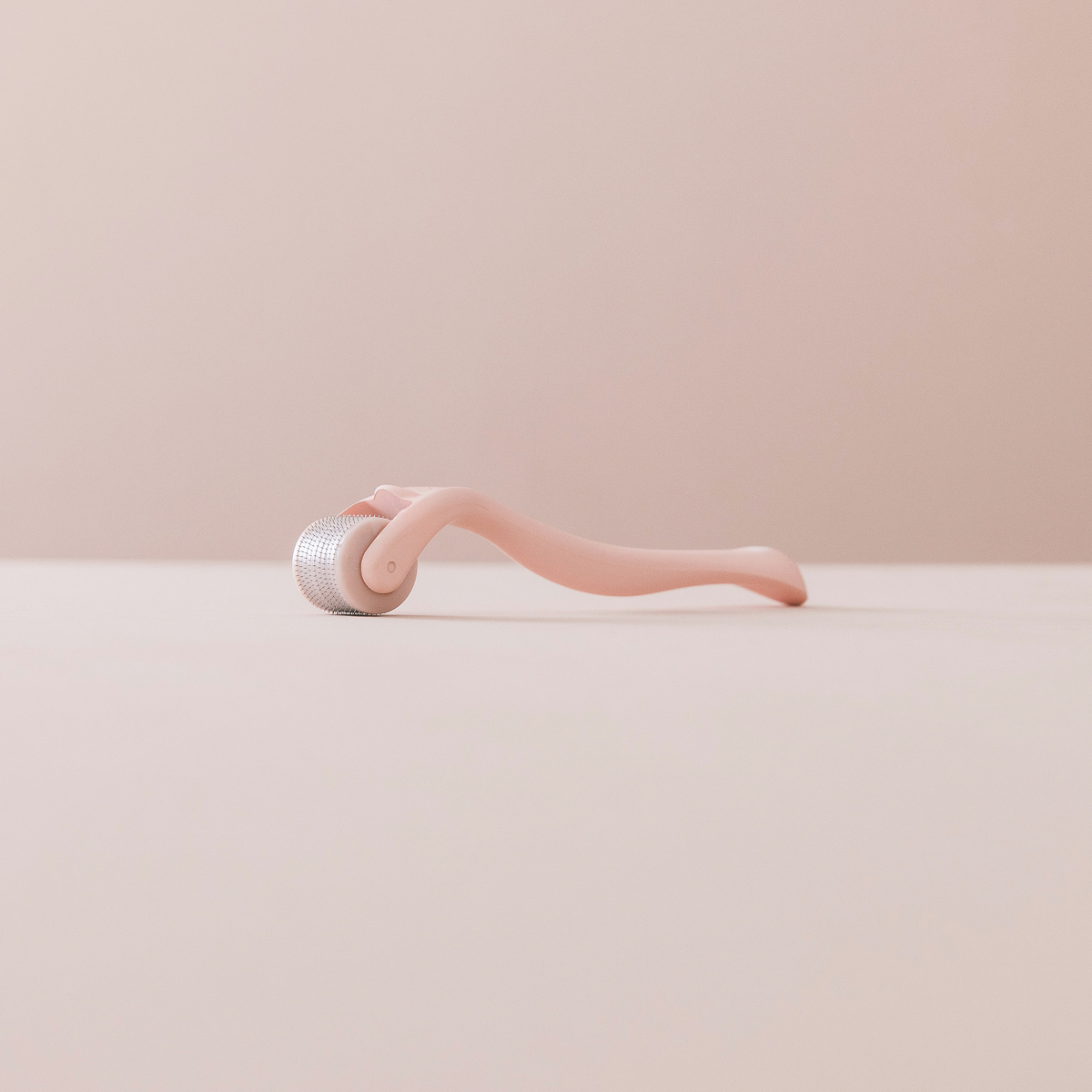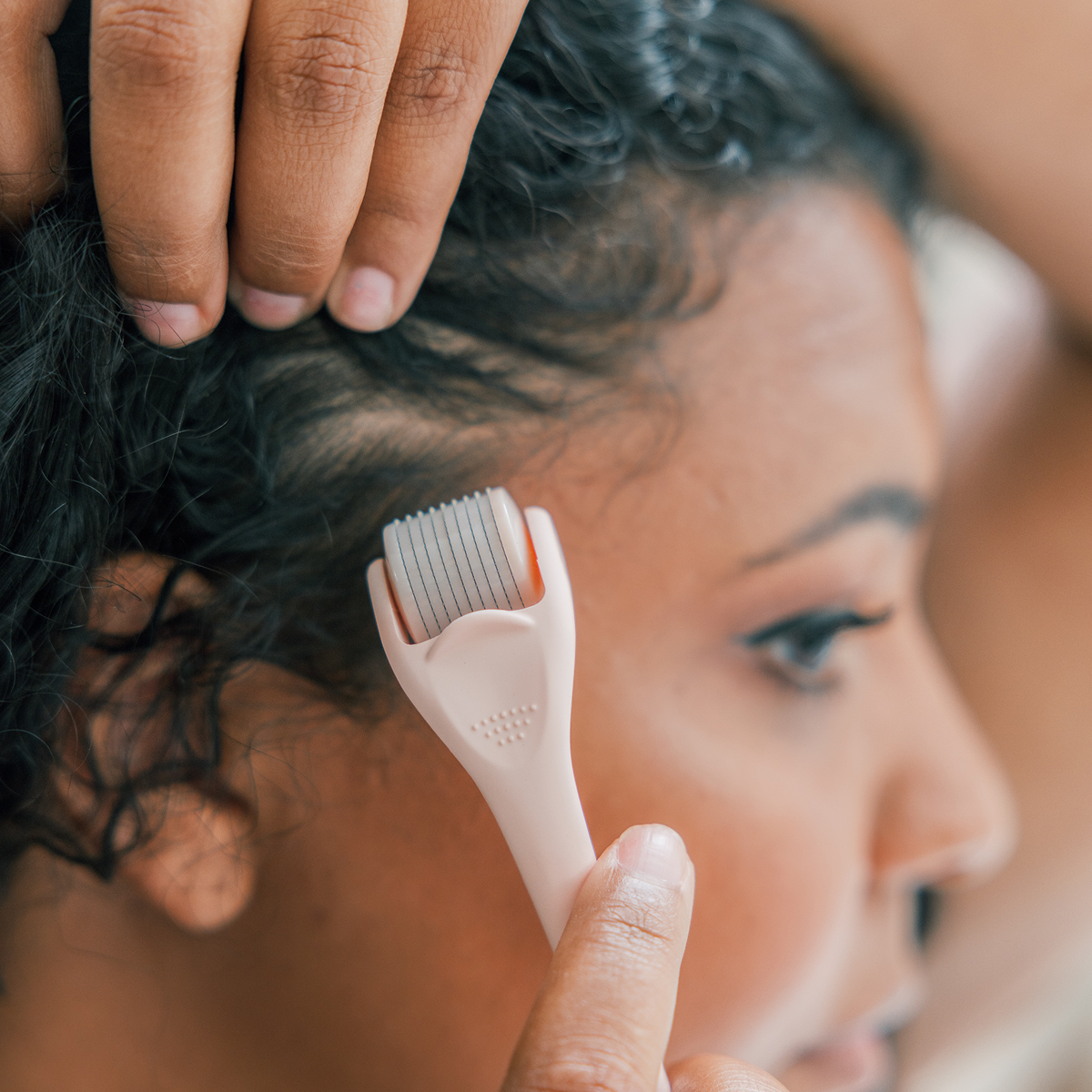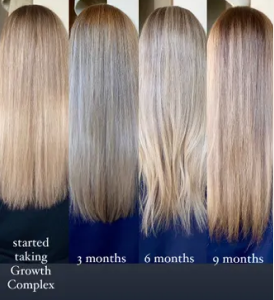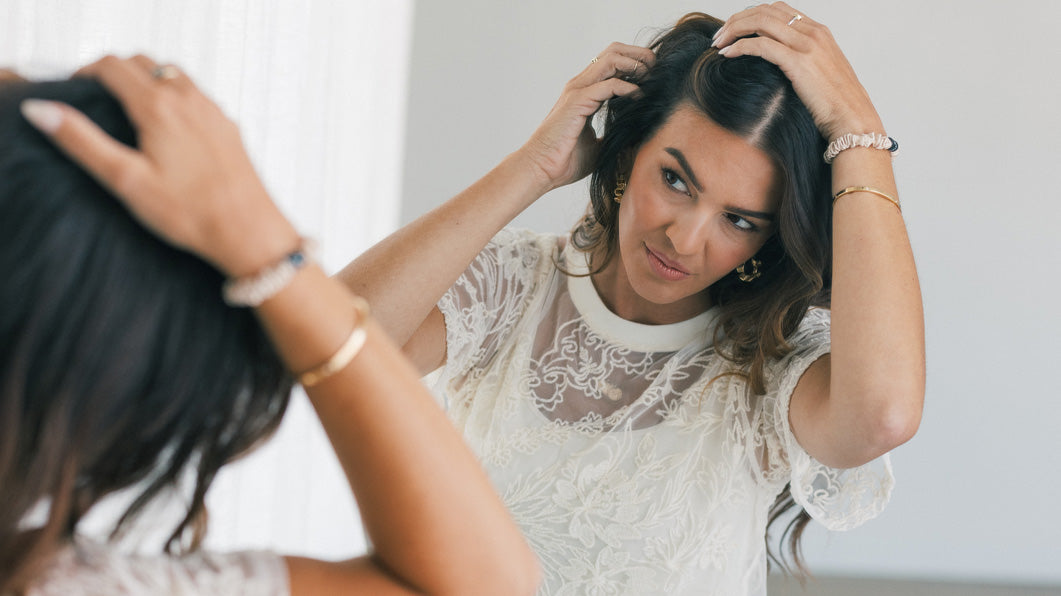Hi beauty! Ever feel like your scalp is trying to tell you something? Well, guess what? It totally is! Our bodies are amazing and drop little hints when something needs to change.
So if your scalp is itchy, dry, oily, or flaking, then your body is trying to send you a message.
Let’s decode your scalp’s secret language together and take a closer look at:
✔️ Why your scalp health matters for hair growth
✔️ What a healthy scalp looks like
✔️ Common scalp issues
✔️ Tips for your scalp health
The Scalp–Hair Connection: Your Scalp and Hair Loss
When you first start thinking about hair loss, it’s easy to overlook the scalp. But your scalp is the foundation for vibrant hair growth. Think of it like growing a plant. Your scalp is fertile soil for your hair. If your scalp is healthy, it sets the stage for your hair follicles to do their thing and thrive.
How does that work? When the scalp is free from issues like dryness, excessive oiliness, or inflammation, it promotes optimal blood circulation. Blood flow sends nutrients and oxygen to your hair follicles, which is essential for strong and healthy hair.
On the other hand, the opposite is true — an unhealthy scalp can cause poor blood circulation, which deprives hair follicles of the essential nutrients they need to flourish. An irritated or inflamed scalp can disrupt your normal hair growth cycle. Conditions like dandruff or seborrheic dermatitis, if left untreated, can contribute to hair shedding and thinning.
So to sum it all up… yes, your scalp health is an important step in hair growth! By prioritizing your scalp, you can create the right setting for hair follicles, promoting stronger, thicker, and more resilient hair growth.
What Does a Healthy Scalp Look Like?
So at this point you’re probably wondering, what does a healthy scalp look like? There’s lots of signs of a healthy scalp. Here’s what you should keep an eye out for:
- Not too oily or too dry. A healthy scalp has the right amount of sebum production, which is what your body produces to keep your scalp moisturized. You want to avoid the extremes of oiliness or dryness, and instead find a balance between the two.
- No signs of redness or inflammation. A healthy scalp is a white or light pinkish color. Any redness or inflammation may be a sign of conditions such as dermatitis or psoriasis.
- Flake free. A healthy scalp is free of flaking. When your scalp is too dry, it becomes irritated and flakes off. Loose, white, powdery flakes that sit in the hair are indicators of a dry scalp.
- Feels good and lack of itch. Overall, if you have a healthy scalp, you feel good. You would experience little to no discomfort or irritation.
- Shiny and vibrant hair. This is a big one! The overall health of your scalp is often reflected in your hair. A healthy scalp contributes to shiny, vibrant, and well-nourished hair.
What Are Signs of an Unhealthy Scalp?
Now that we’ve talked about all the positive signs of a healthy scalp, let’s talk about the other signs and what your scalp may be telling you. Typically, if your scalp is out of balance, it leans one of two ways: oily and greasy, or dry as a bone. Here’s a closer look at both oily scalp and dry scalp.
1. Oily Scalp
What Is Oily Scalp? What Causes Oily Scalp?
If your scalp and hair feels greasy and oily, it means your body is making too much sebum, the natural oil produced by the sebaceous glands in the scalp. Sebum is really important for healthy hair since it provides moisture and protection. However, when the sebaceous glands produce more sebum than necessary, it can result in an oily or greasy scalp. This issue often goes hand-in-hand with oily skin and specific skin conditions. Possible factors for oily scalp include diet, extreme humidity, genetics, hormonal imbalances, and stress.
What Is Dandruff? What Causes Dandruff?
When you struggle with an oily scalp, your scalp may tell you with dandruff. Dandruff is a scalp condition where small pieces of skin flake off of the scalp, triggered by too much sebum oil production. Possible factors for dandruff include overgrowth of yeast-like fungus, irregular scalp hygiene, sensitivity to hair care products, and certain medical conditions like eczema and psoriasis.
How Does Dandruff Affect Hair Growth?
It can be embarrassing and uncomfortable to deal with white flakes on your scalp and clothes. But besides the impact on your personal hygiene and appearance, dandruff can have several implications for hair health. It may lead to increased hair shedding, weaken the hair shaft, and create an environment conducive to other scalp issues. Plus, persistent scratching due to discomfort can damage hair follicles.
Ways to Help Dandruff and Oily Scalp
Here’s some ways to help if you’re experiencing dandruff or oily scalp:
- Eat a balanced diet: Ensure a diet rich in nutrients, particularly those essential for skin and hair health, such as B vitamins, omega-3 fatty acids, and zinc.
- Hair and scalp oil training: Hair training is teaching your hair to produce the right amount of oil by gradually reducing the frequency of hair washing. For oily hair, hair training can be really helpful to find a good balance of sebum production.
- Limit styling products: Reduce the use of styling products, as they can contribute to oil buildup on the scalp. When using products, choose those labeled as non-comedogenic and avoid harsh hair styling products that may contribute to scalp irritation.
- Manage stress: Chronic stress can make dandruff worse. Practice stress-reducing activities like deep breathing exercises, gratitude journaling, meditation, or yoga.
- Regular brushing: Brushing your hair helps distribute natural oils from your scalp, preventing them from accumulating at the roots. Look to use a hair brush gentle on the scalp, like a Denman Hair Brush.
- Scalp massage: Try incorporating a gentle scalp massage in your routine to help exfoliate dead skin cells and improve blood circulation. Our Detox Scalp Massager can help remove any build-up and promote a balanced scalp.
- Stop overwashing your hair in hot water: It can be tempting to treat oily hair by washing it more frequently, but this can actually strip your scalp of its moisture, which triggers your body to only make more! Opt for a natural dry shampoo for a few days before showering next.
2. Dry Scalp
Dandruff vs. Dry Scalp: What’s the Difference? What Causes Dry Scalp?
Dandruff and dry scalp are often confused for each other because dry scalp can also lead to flaking. But while dandruff is from too much sebum production, dry scalp is not enough sebum. Lots of factors impact dry scalp, including excessive showering in hot water, harsh hair products, old age, poor diet, skin conditions like eczema and psoriasis, underlying health conditions like hormonal imbalances, and winter weather.
How Does Dry Scalp Affect Hair Growth?
If your scalp is dry, you may end up itching and scratching, which damages hair follicles and leads to breakage. Plus, insufficient scalp moisture makes the hair more prone to breakage, affecting its overall strength and appearance. Inflammation and irritation linked to dry scalp can also hurt hair follicles and disrupt the normal hair growth cycle. Dry scalp may limit the supply of oxygen and nutrients to the hair follicles, crucial components for healthy growth.
Ways to Help Dry Scalp
- Argan oil or tea tree oil: Consider adding an oil for dry scalp, like argan oil or tea tree oil, to your hair routine. These oils are known for their anti-inflammatory and anti-fungal properties, as well as help promote a healthy, balanced scalp.
- Avoid hot water and overwashing your hair: To avoid stripping away natural oils from the scalp when washing your hair, use lukewarm or cool water instead of hot water and lessen hair washing frequency. Opt for a washing routine that suits your hair type and lifestyle.
- Eat a balanced diet: A nutrient-rich diet with foods high in omega-3 fatty acids, vitamins, and minerals can promote healthy sebum production and lower inflammation.
- Humidifier: In dry climates or during winter, use a humidifier to add moisture to the air, which helps out both your skin and scalp.
- Hydration: The amount of water you drink reflects on the health of your skin, including the scalp. Aim to drink enough water for your build and activity level.
- Manage stress: Chronic anxiety and stress can increase inflammatory reactions in the body and actually lead to or worsen dry scalp. To lower stress, try relaxing activities like deep breathing exercises, gratitude journaling, meditation, or yoga.
- Safely style your hair: Try to reduce using styling tools that can fry your hair. Also, look for ways to take better care of your hair. Denman hair brushes and silk scrunchies are two great ways to more safely style your hair in your everyday life.
- Scalp massage: Incorporate a gentle scalp massager for hair growth and to stimulate blood circulation and promote natural oil distribution, like our Detox Scalp Massager.
- Use natural moisturizing ingredients: Use safe, natural hair products specifically designed for dry scalp, with moisturizing ingredients like glycerin or hyaluronic acid. Avoid harmful chemicals that can cause irritation and disrupt the scalp's natural moisture balance.
If any of this sounds like you, your scalp may be trying to send you a message! Recognizing the signs of a healthy scalp can help you create the best environment for hair growth. Whether you’re dealing with an oily scalp or a dry scalp, the key lies in understanding your scalp’s unique needs.
Remember, a healthy scalp is not only the secret to strong, luscious locks but also an essential component of a self-care routine. So, listen to what your scalp is telling you, nurture it with care, and watch your hair flourish in return.
XOXO,
Kaley



























